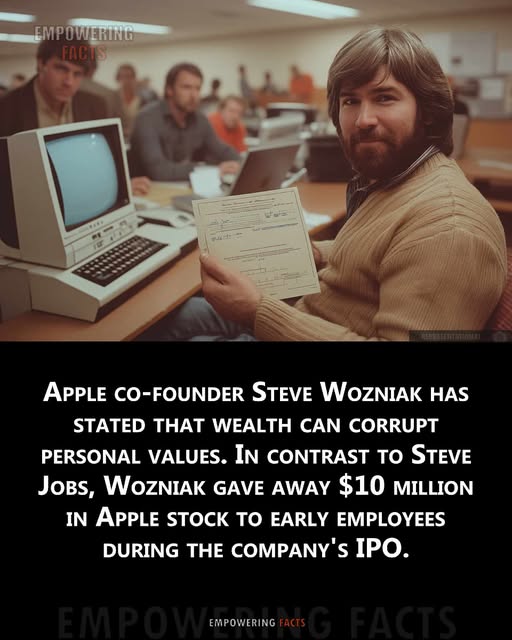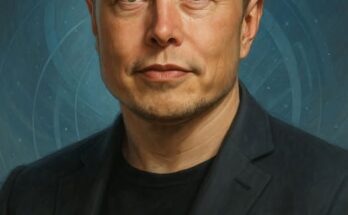In an era dominated by billionaire entrepreneurs and aggressive capitalism, Steve Wozniak stands as a rare figure whose values challenge the dominant narrative of Silicon Valley success. Best known as the co-founder of Apple Inc. and the engineering mastermind behind the personal computer revolution, Wozniak is equally notable for his unorthodox relationship with wealth. In stark contrast to his peers, he has publicly expressed discomfort with extreme wealth, cautioning that it can warp behavior, compromise ethics, and distort priorities. His actions—especially his decision during Apple’s 1980 initial public offering (IPO) to voluntarily distribute a portion of his stock worth approximately $10 million to early employees—reveal a deeply held philosophy centered on fairness, humility, and team-oriented thinking.
This essay explores Steve Wozniak’s relationship with wealth, the motivations and impact of his unprecedented stock giveaway, and how his moral compass distinguishes him from other tech leaders of his generation. It also examines the cultural and historical context of Silicon Valley during the 1970s and 1980s, and reflects on how Wozniak’s ideals remain both radical and relevant in today’s climate of income inequality and corporate excess.

The Early Years: A Human-Centric Technologist
Steve Wozniak was born on August 11, 1950, in San Jose, California. A brilliant engineer from a young age, he was fascinated by electronics and spent countless hours building gadgets, including early versions of computers and calculators. His father, Jerry Wozniak, an engineer at Lockheed, instilled in him a strong sense of ethics and a belief in the importance of sharing knowledge.
When Wozniak met Steve Jobs in the early 1970s through mutual friends, the partnership between technical genius and charismatic marketer took root. Together, they founded Apple Computer in 1976 along with Ronald Wayne. Wozniak designed the Apple I and Apple II, both revolutionary in their compactness, usability, and affordability, which laid the foundation for the modern computing era.
From the beginning, Wozniak was not motivated by financial gain. He was more interested in creating technology that could empower individuals, reduce barriers, and foster learning. He famously stated, “My goal wasn’t to make a ton of money. It was to build good computers.”
Apple’s Meteoric Rise and the 1980 IPO
As Apple grew from a garage-based startup into a formidable force in computing, it began attracting attention from venture capitalists and institutional investors. The Apple II, launched in 1977, became one of the best-selling personal computers of its time. By 1980, Apple was ready to go public.
Apple’s initial public offering on December 12, 1980, was a watershed moment. It created hundreds of millionaires overnight and cemented Apple’s place in tech history. Steve Jobs and Steve Wozniak became multimillionaires instantly, but the way each handled this newfound wealth differed drastically.
Wozniak took a stand against the inequity he perceived in how stock options had been distributed. Several early employees—technicians, administrative staff, and engineers who had been instrumental in Apple’s early operations—were excluded from receiving stock before the IPO. Wozniak believed this was unjust.
Acting on his own volition, Wozniak voluntarily gifted away roughly $10 million worth of his personal shares to dozens of these overlooked employees. This act of generosity was not mandated by Apple, nor was it part of a public relations campaign. It was a deeply personal decision grounded in Wozniak’s belief in fairness, loyalty, and recognition.
The Philosophy Behind the Gift
Wozniak’s rationale for giving away a significant portion of his wealth was simple: he believed success was a team effort. In various interviews over the years, he explained that many people helped build Apple in its formative years—writing code, fixing hardware, organizing paperwork, or simply keeping morale high. In Wozniak’s view, they deserved to share in the company’s success.
He also viewed extreme wealth with suspicion. Wozniak has said, “I never wanted to be rich. I never wanted to be a CEO.” He often emphasized that money should not be the primary motivator for innovation or work. His engineering ethos placed value on ingenuity, not financial return. Wozniak repeatedly warned that chasing wealth could lead people to make unethical choices, betray their values, or lose touch with what really matters—people, learning, and doing good.
A Stark Contrast to Steve Jobs
The contrast between Wozniak and Jobs was dramatic. While Jobs had an intense drive to control, perfect, and monetize, Wozniak remained focused on building and sharing. Jobs once declared that “real artists ship,” emphasizing execution and market success, while Wozniak seemed to channel a more altruistic spirit, emphasizing creativity for its own sake and celebrating the joy of invention.
Jobs did not give away any shares during the IPO and had a more combative stance when it came to wealth and power. Their differences were philosophical as well as personal. Wozniak respected Jobs’s genius but disagreed with how he treated others, especially subordinates and colleagues. While Jobs was known for emotional outbursts and a sometimes tyrannical leadership style, Wozniak was known for kindness, accessibility, and democratic values.
Silicon Valley’s Culture of Ownership
During the late 1970s and early 1980s, Silicon Valley was evolving into a powerful economic engine fueled by innovation, investment, and IPOs. Equity ownership became the cornerstone of compensation for startup employees. However, access to stock options was often arbitrary, and lower-level employees were frequently left out of the wealth bonanza.
In this context, Wozniak’s action was revolutionary. Most founders protected their equity jealously, viewing it as a hard-earned asset and a ticket to power. Distributing personal shares as Wozniak did was considered unusual—if not outright foolish—by some in the financial world. But for Wozniak, the decision was moral, not strategic. He wanted to set an example that generosity and fairness mattered more than personal fortune.
His belief in egalitarian wealth distribution aligns more with cooperative models of economics than with Silicon Valley’s venture-capital-driven hierarchy. He seemed to believe that in a just workplace, wealth should follow contribution, not just position or title.
Later Reflections on Wealth and Society
Wozniak’s views on wealth have remained consistent. In the decades following Apple’s IPO, he continued to express unease with the excesses of the tech industry. He has repeatedly said that massive fortunes can corrupt people’s sense of reality, leading them to value money over relationships, ethics, or personal growth.
In interviews, Wozniak has stated that he does not keep track of his net worth and that he doesn’t live extravagantly. He enjoys his Tesla and his gadgets, but he doesn’t amass luxury homes or islands like other billionaires. His primary joy seems to come from teaching, mentoring, and building things. He’s taught public school computer classes anonymously, donated to science museums, and frequently attends tech fairs and hackathons—not as a celebrity, but as a participant.
Wozniak also speaks out against the growing wealth gap and the monopolistic behavior of large tech firms. He has advocated for stronger privacy protections, ethical uses of technology, and greater corporate accountability. His criticism of Apple’s privacy practices and tax avoidance tactics shows that he doesn’t blindly defend the company he co-founded.
The Broader Impact of His Generosity
The employees who received Wozniak’s stock gifts have shared stories of gratitude and amazement. Many of them used the money to pay off debts, buy homes, or fund their children’s education. For them, Wozniak’s gift was life-changing—not just financially, but emotionally. It validated their contribution and restored their faith in fairness.
Wozniak’s gesture set a precedent, even if it wasn’t widely followed. His story continues to circulate in tech ethics discussions, often cited as a counterexample to the profit-maximizing ethos that dominates the industry. In an ecosystem where founders often hoard equity and glorify billionaire status, Wozniak’s act remains a powerful reminder that values can—and should—guide wealth.
Comparisons with Other Tech Founders
Wozniak’s approach is particularly striking when compared to other tech founders like Bill Gates, Larry Ellison, Jeff Bezos, and Mark Zuckerberg. While many of these figures have engaged in philanthropy—some quite generously—it has usually come after wealth accumulation, and often under the umbrella of structured foundations or media campaigns.
Wozniak’s generosity, by contrast, was immediate, personal, and unpublicized at the time. He didn’t wait to become a billionaire to give back. He didn’t use a tax shelter or a PR campaign. He simply wrote checks to people he believed were treated unfairly. This directness and sincerity make his generosity feel more authentic and less transactional.
Wozniak also avoided using his wealth to acquire power. He didn’t try to control boards, influence politics, or build a media empire. Instead, he stayed close to his roots as an engineer and educator. He often says that he measures success not by money or fame, but by happiness and the ability to make a difference.
A Living Example of Ethical Wealth
Wozniak continues to serve as an icon of integrity in an industry increasingly criticized for its ethical blind spots. In 2006, he founded the “Woz U” education platform, aimed at providing affordable tech training. He travels the world promoting STEM education, and he speaks candidly about the importance of humility, ethics, and fairness in technology.
His life raises important questions: What is wealth for? Who deserves it? How should it be shared? In answering these questions through his actions, Wozniak has shown that there is an alternative path—one that values people over profit, ethics over ego.
Conclusion: A Legacy of Conscience
Steve Wozniak’s story is not just one of technological innovation—it’s one of moral imagination. While he could have easily joined the ranks of the ultra-wealthy without question, he chose a different path. His discomfort with extreme wealth, his decision to share his fortune, and his commitment to fairness make him a model of ethical leadership in an age of inequality.
Wozniak’s actions during Apple’s IPO, and his continued commitment to equity and recognition, have had a ripple effect far beyond the halls of Cupertino. They challenge the tech industry—and society at large—to rethink what success looks like, and to remember that the truest wealth lies not in accumulation, but in how we treat others along the way.

